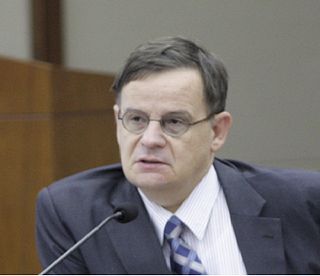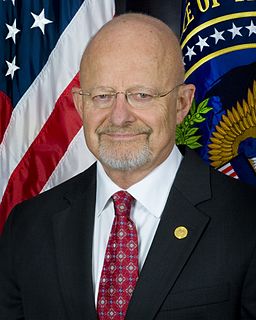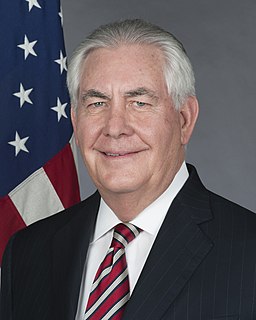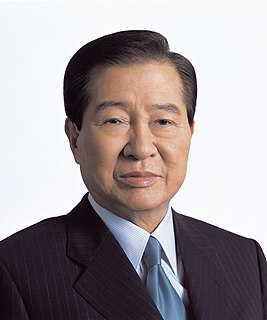A Quote by Andrei Lankov
Most people in Seoul don't care about the North's belligerent statements: The farther one is from the Korean Peninsula, the more one will find people worried about the recent developments here. Scary impressions are important to North Korea because for the last two decades its policy has been, above all, a brilliant exercise in diplomatic blackmail. And blackmail usually works better when the practitioners are seen as irrational and unpredictable.
Quote Topics
About
Above
Because
Been
Belligerent
Better
Blackmail
Brilliant
Care
Decades
Diplomatic
Don't Care
Exercise
Farther
Find
Important
Impressions
Irrational
Korea
Korean
Korean Peninsula
Last
More
Most
North
North Korea
Peninsula
People
Policy
Recent
Scary
Seen
Statements
Two
Unpredictable
Will
Works
Worried
Related Quotes
During the periods when South Korea played a more active role, the inter-Korean relationship was more peaceful, and there was less tension between the United States and North Korea. The last U.S. administration pursued a policy of strategic patience and did not make any effort to improve its relationship with North Korea. Also, the previous Korean government did not make any such efforts. The result is the reality you see today - North Korea continuing to advance its nuclear and missile program.
North Korea is no threat at all. I have already spoken about it during countless televised interviews. I visited North Korea and mingled with its people. There, nobody wants war. The North Korean people paid a terrible price for their independence. Its civilians were murdered mercilessly in tunnels by Western forces; its women were brutally raped, entire villages and towns leveled to the ground, or burned to ashes. All this is never discussed in the West, but is remembered in North Korea.
If we - particularly, if we peremptorily attack North Korea - that without deliberation, that North Korea will reflexively unleash all the rocketry and artillery - which they're pretty good at, by the way - on Seoul, and do as they vowed many times, to convert Seoul into a sea of fire. So, if we do something like this, this will have cataclysmic results.
It's important to understand the policy of the U.S. towards North Korea is to deny North Korea possession of a nuclear weapon and the ability to deliver that weapon. Our strategy has been to undertake this peaceful pressure campaign we call it enabled by the four no's.The four no's being that we do not seek regime change, a regime collapse, an accelerated reunification of the peninsula, and we do not seek a reason to send our forces north of the demilitarized zone.
Beijing cannot sit by and let her North Korean ally be bombed, nor can it allow U.S. and South Korean forces to defeat the North, bring down the regime, and unite the peninsula, with U.S. and South Korean soldiers sitting on the Yalu, as they did in 1950 before Mao ordered his Chinese army into Korea.
I think the regime in North Korea is more fragile than people think. The country's economic system remains desperate, and one thing that could happen for example would be under a new government in South Korea, to get the South Korean government to live up to its own constitution, which says any Korean who makes it to South Korea, is a Korean citizen. A citizen of the Republic of Korea. And you could imagine the impact that would have inside North Korea if people thought, "If I could get out and make it to South Korea, I could have a different life."
In contrast, Western historians, and those in South Korea, say the North attacked the South on June 25, 1950. Both sides agree that after the war began, the North Korean Army captured Seoul in three days and pushed as far south as Pusan before American troops arrived to drive back the North Koreans nearly as far north as the border to China.
The message that we must send to North Korea is twofold: If the North Korean regime believes that it can defend and protect itself through nuclear and missile programs, that is a misjudgment. But if North Korea gives up its nuclear program, we will help it secure and develop itself. We must consistently send these two messages.
President Trump and I have a common goal - that is the complete dismantlement of North Korea's nuclear program and the denuclearization of the Korean Peninsula. In the process of working toward that common goal, the friendship and trust between the two of us will be very important. I hope we will be able to show the world that the collaboration between our two countries is strong and will continue to grow stronger.
We need an effective American diplomacy that will marshall the resources of nations in the Asian Pacific Rim to put pressure on North Korea, on Kim Jong-un, to abandon his nuclear ambitions. It has to remain the policy of the United States of America, the denuclearization of the Korean peninsula, plain and simple.




























